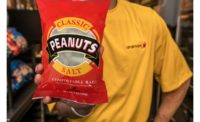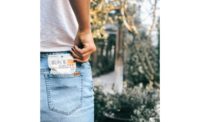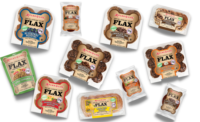As part of its ongoing commitment to the environment, ShopRite says it’s launching what it describes as the first durable yet compostable nonwoven, reusable shopping bag in the U.S. Supplied exclusively by Burbank, Calif.-based Earthwise Bag Co., the bag will be sold in selected ShopRite stores in New Jersey, New York, Connecticut, Pennsylvania, Maryland and Delaware.
“ShopRite has a long history of innovation, and we continue to look for new ways to ‘green’ our business practices,” explains Karen Meleta, spokeswoman for Keasbey, N.J.-based Wakefern Food Corp., a retail co-op whose members operate almost 250 Northeastern supermarkets under the ShopRite banner.
Earthwise creates the bags from a combination of corn and tapioca fibers, using byproducts from the food manufacturing process. This reuse of waste materials further reduces the amount of material entering the waste stream. Printed using water-based inks and sewn with cotton thread, the bags contain no petroleum, are nontoxic and carry the ASTM 6400 certification, a national standard for biodegradability and compostability bestowed by the Bethesda, Md.-based U.S. Composting Council. They also feature distinctive leaf embossing to set them apart from other bags in the marketplace.
Machine-washable and tested to hold more than 50 lb., the bags have a wear life of at least 100 uses, according to the company, and can be composted at commercial composting facilities, where they will biodegrade within 90 days.
Meanwhile, BASF, The Chemical Co., says it’s making a game-changing breakthrough with the debut of a sustainable snack package that can help companies reduce waste. On Sept. 5, BASF partnered with major league baseball’s Seattle Mariners in the use of the bag for peanuts. The first 10,000 fans who arrived at Safeco Field that day received a free bag of peanuts in a 100%-compostable snack bag. The prototype packaging was developed with BASF’s advanced biopolymer technology.
“Flexible packaging with this BASF technology is a big step forward for the snack food industry,” notes Kimberley Schiltz, market development manager, consumer packaging, at BASF. “It means that popular snack foods can be brought to market in compostable packaging that delivers needed shelf-life at a competitive price point, with a more sustainable ‘end-of-life’ solution than with conventional packaging materials.”
This season, the Mariners team says it’s expecting to divert 85% of its waste from landfills, up from just 12% in 2006. Mariners vice president of operations, Scott Jenkins, hopes to reach a 90% diversion, but closing the gap has proved to be an elusive goal. “All of our service ware is already compostable, but snack food bags have been one of the biggest barriers preventing us from getting to our goal,” he says. “Flexible packaging made with BASF biopolymers could represent the holy grail of greening for our wastestream.”
Source: www.democraticunderground.com, BASF, The Chemical Co.




